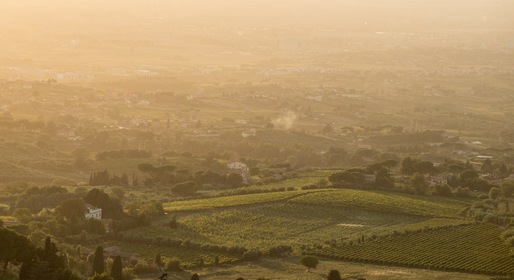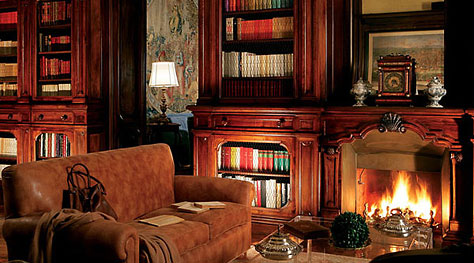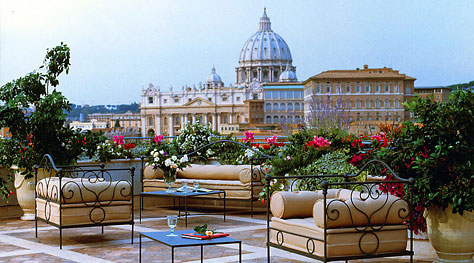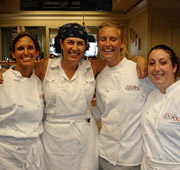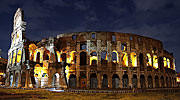Frascati, Rome's Wine Country
Just half an hour outside Rome, the Frascati wine country is an easy daytrip.
Imagine rolling hills, covered with rows and rows of vines. Century old olive groves. Gates and avenues with sentinels of tall cyprus trees leading into noble and ancient vineyards. Places, panoramas, and atmospheres that have inspired poets and artists throughout the centuries. Surprised if I tell you I'm talking about the Frascati DOC/DOCG denomination area just half an hour south east of Rome and not somewhere lost in the Tuscan or Umbrian countryside? Then you have obviously not yet visited. There is much more than first meets the eye.
The Roman suburbs may sprawl further and further, but thanks to the tenacity of the wine estates, sticking to their guns and preferring to try to make ends meet, battling with the unpredictability of nature and the elements rather than throwing in the towel and giving up their beautiful land to cement, inside, hidden within the hedges, behind tall trees, low blocks of flats, and villini, are grand and ancient farmhouses still pulsating with a green heart, breathing out gasps of must, or newly-bottled wine, mingling with the indescribable perfume of ancient Roman caves.
Caves left over from when seven of the 11 Roman aqueducts provided Roman villas with water. Caves that were once castella in Latin, probably the real reason for the name Castelli Romani. Take, for instance, the Principe Pallavicini Estate, still owned by one of the oldest and most important noble families in Italy. Since 1670. That's a long history of wine making. An amazing amount of casks, then bottles, being sent to Rome, including to popes such as the estate's own Clement the IXth 1667-69, and before him Gregory the XVth. This is one of the most beautiful that opens to visitors by arrangement and with 20 different types of grapes making 13 different award-winning wines, it is definitely a compulsory destination today just as it was during the Grand Tour.
Why not stay a couple of days in the area and visit a selection of estates? Try Casale Marchese, Pietra Porzia, Casal Montani, and Casale Pilozzo, all equally special. Only estates in this part of the world can boast a view of Rome!
Frascati is in the heart of the Castelli Romani and, along with Albano, on the edge of the famous volcanic lake, it is one of the largest of the 17 towns that crown the hills. Like the other towns, it was founded by the Latins, which were a pre-Roman race descending, as legend has it, from either Telegonus, illegitimate son of Ulysses and Circe, or from Aeneas of Troy. If the Latins hadn't settled here in the Castelli (as the locals say), Rome would never have been founded: Romulus and Remus were in fact, born in Albano (then known as Albalonga).
Ancient Frascati was called Tusculum and was a flourishing town long before Rome. Many important Romans were actually born here, including at least 2 of the 7 kings. As Rome grew in importance the two towns, being just 15/16 miles apart, became antagonists and eventually Rome defeated Tusculum, with the help of Castor and Pollux, at the battle of Lake Regillus in 496 BC, even though the Latins had had the Etruscans as their allies. The Romans appreciated the fabulous position and resources that they found up on the Tusculum hill and it soon became a favorite resort for wealthy Romans, with sumptuous villas springing up all over. Obviously one of those resources was the vines that flourished on the volcanic soil!!!
Even though grapes were being grown and wine already being made hundreds of years before in Armenia, Georgia, and Syria, it was the Romans who perfected the technique and turned wine production into a precise business. Cato the Elder (one of our famous Romans bornin Tusculum in 234 BC) wrote a treatise on how to run a farm and how to grow vines to make wine. He even invented a press. Romans had found a healthy source of refreshment for when clean water wasn't readily available. Adding wine to water (sometimes even sea water) made the water safe to drink. Herbs were added as well to make medicinal concoctions. Wherever the legions went, their vines went, ready to make sure everyone got their ration. They weren't just soldiers but able artisans, builders, and farmers and they spread wine making throughout Europe. (Yes, even to France!).
Frascati was obviously not the only area growing grapes at that time, but it was the closest to Rome and vineyards spread down into the city itself. Frascati and Colli Albani wines were amongst the Romans' favorites.... this land has been providing the city with wine for the past 2500 years.
Across the centuries, with various evolutions in the production techniques, constantly, season after season, rivers of delicious nectar have been flowing, quenching the thirsts of emperors, slaves, philosophers, princes, popes and visitors. Visitors, yes. Because tourism in the city of Rome has existed ever since Christian pilgrims began coming to Rome in the search of relics. Middle Ages, Renaissance, Grand Tour, Dolce Vita...
Baroque villas were the pride of Frascati, designed, built and decorated by the same celebrated architects and artists that had erected Rome, and owned by the same nobility. Yet again it had become the holiday destination of the aristocracy, welcoming their special guests from all over Europe to magnificent banquets and balls in the countryside. The area is still renowned for its cuisine and typical dishes can be sampled in many of the restaurants. Or why not learn how to cook some yourself? Jo Donghi (local food-blogger and culinary coach) holds some magnificent courses in English right in the center of Frascati and you can add a lot to your repertoire even in the space of one morning . She will also share her knowledge of wines with you to give you tips on perfect pairings.
Frascati was one of the first ever DOCs, together with Chianti, and the Frascati Consortium one of the first in Italy, protecting Frascati DOC and DOCG (whites) and Cannellino DOCG (a sweet white) that are gaining more and more awards. With many of the cellars also producing fabulous red wines, as good as many of the Tuscans, but much better value for money. The volcanic terroir and the climate are perfectly suited to both. When you visit an estate in the area, you not only encounter wine, but also centuries of history, culture and hard work.
When Goethe said that 'Frascati is a paradise', he knew what he was talking about.
For information on Frascati, the vineyards the environs and a host of activities and services, take a look here. An mp3 download of their walking tour is free when you buy the €10 discount pass.
All photo credits: Michelle Aschbacher
Our Insider is
Could you be our next Insider? Share your love of Italy by contributing to ItalyTraveller! See how!
Food & Drink
Main destinations
Hotels in the area
- Useful links
- Lazio
- Rome Hotels
- Lazio (all hotels)

